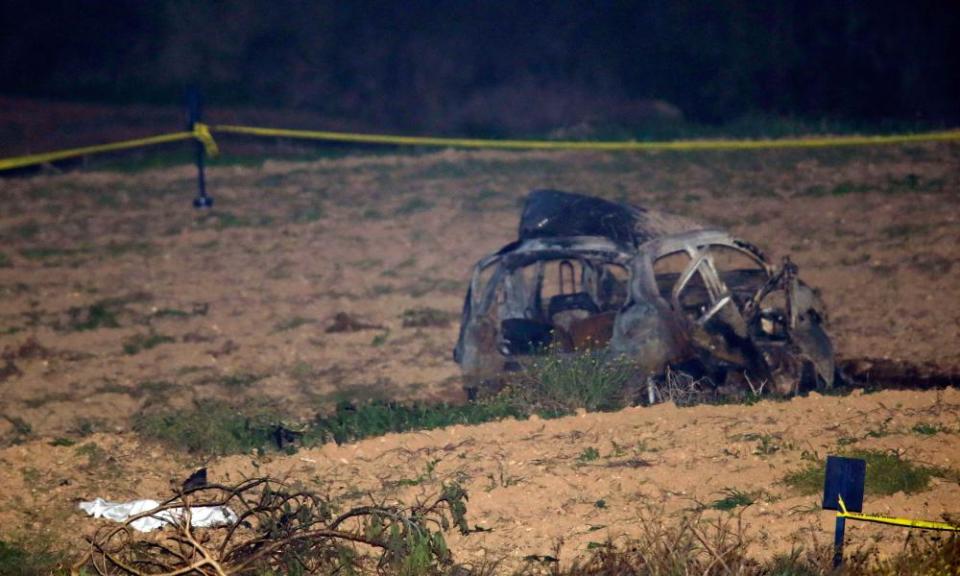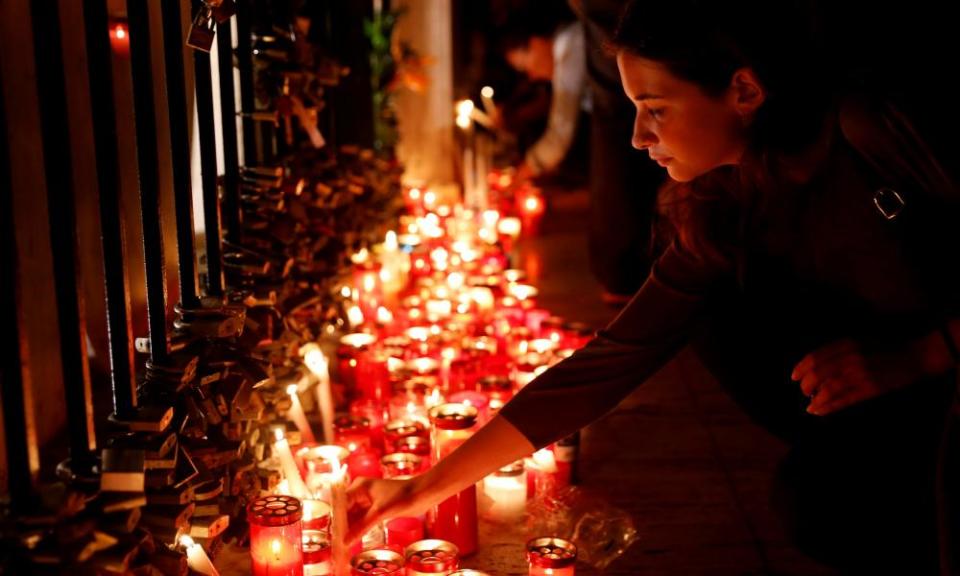Murdered Panama Papers journalist's son attacks Malta's 'crooks'

The son of the murdered Maltese investigative journalist and blogger Daphne Caruana Galizia has described running desperately round the blazing car in which she died and hit out bitterly at the island’s “culture of impunity” and the “crooks” in charge.
“My mother was assassinated because she stood between the rule of law and those who sought to violate it, like many strong journalists,” Matthew Caruana Galizia wrote in a moving and at times graphic Facebook post.
“But she was also targeted because she was the only person doing so. This is what happens when the institutions of the state are incapacitated: the last person left standing is often a journalist. Which makes her the first person left dead.”
Daphne Caruana Galizia, who led the Panama Papers investigation into corruption in Malta on which her son, another investigative journalist, also worked, was killed on Monday afternoon when her Peugeot was destroyed by an explosive device so powerful it scattered large pieces of the car around a nearby field.
Several thousand people gathered at an impromptu candlelit vigil in Sliema, near the island’s capital Valletta, on Monday night to mourn the journalist, described as a “one-woman WikiLeaks” whose blogs were as fiercely critical of the island’s politicians as they were of its organised crime gangs.
Matthew Caruana Galizia said he would never forget “running around the inferno in the field, trying to figure out a way to open the door, the horn of the car still blaring, screaming at two policemen who turned up with a single fire extinguisher to use it”.
One of the policemen said: “Sorry, there is nothing we can do,” he wrote. “I looked down and there were my mother’s body parts all around me. I realised they were right, it was hopeless. ‘Who is in the car?’, they asked me. ‘My mother is in the car. She is dead. She is dead because of your incompetence.’”
Caruana Galizia, 53, ran a hugely popular blog relentlessly highlighting cases of alleged high-level corruption among politicians across Malta’s party lines. “There are crooks everywhere you look now. The situation is desperate,” she wrote in a post published barely half an hour before the bomb exploded.

Witnesses told police the journalist had just left her home and was on a road near the village of Bidnija in northern Malta when the bomb detonated. Local media reported she had filed a complaint to the police two weeks ago to say she had received threats.
Caruana Galizia’s most recent revelations pointed the finger at Malta’s prime minister, Joseph Muscat, and two of his closest aides, connecting offshore companies linked to the three men with the sale of Maltese passports and payments from the government of Azerbaijan.
Muscat denounced the journalist’s killing on Monday, calling it a “barbaric attack on press freedom”, and announced that the US Federal Bureau of Investigation (FBI) had agreed to send a team of experts to help local police investigate. “I will not rest until I see justice done in this case,” Muscat said.
“Everyone knows Caruana Galizia was a harsh critic of mine, both politically and personally, but nobody can justify this barbaric act in any way,” added the prime minister, who sued the journalist and won a snap election in June called as a vote of confidence to counter her allegations.
While Caruana Galizia’s targets were mainly the ruling Labour party and their supporters, she had more recently turned her fire on Malta’s opposition whose leader, Adrian Delia, said she had been the victim of a “political murder” and called for an independent investigation into her killing.
“We will not accept an investigation by the commissioner of police, army commander or duty magistrate, all of whom were at the heart of criticism by Caruana Galizia,” Delia said. “What happened today is not an ordinary killing. It is a consequence of the total collapse of the rule of law which has been going on for the past four years.”
Caruana Galizia’s targets ranged from allegedly corrupt politicians to banks facilitating money laundering and the links between Malta’s online gaming industry and the mafia. Her recent work had focused particularly on revelations from the Panama Papers, a huge cache of leaked documents from the leading offshore law firm Mossack Fonseca.
European politicians expressed shock and dismay at her death. “A dark day for democracy,” tweeted Manfred Weber, a leading conservative MEP. The European commission vice-president, Frans Timmermans, who had received a letter from a Maltese MEP complaining of “intimidation” of journalists in Malta, tweeted that he was “shocked and outraged … If journalists are silenced, our freedom is lost.”

Matthew Caruana Galizia said in his Facebook post that his mother’s killing was “no ordinary murder and it was not tragic. Tragic is someone being run over by a bus. When there is blood and fire all around you, that’s war. We are a people at war against the state and organised crime, which have become indistinguishable.”
He criticised “that clown of a prime minister”, making statements to parliament “about a journalist he spent over a decade demonising and harassing”, and highlighted a Facebook post by a police sergeant who shortly after the murder wrote: “Everyone gets what they deserve, cow dung! Feeling happy :)”
Caruana Galizia concluded: “Yes, this is where we are: a mafia state … where you will be blown to pieces for exercising your basic freedoms, only for the people who are supposed to have protected you to instead be celebrating it.”
He said a “culture of impunity” had been allowed to flourish on the island after the prime minister “filled his office with crooks, then the police with crooks and imbeciles, then the courts with crooks and incompetents.
“If the institutions were already working, there would be no assassination to investigate – and my brothers and I would still have a mother.”
Following an application by the dead journalist’s family, the investigating magistrate, Consuelo Scerri Herrera – who had come under criticism from Caruana Galizia in her blog and subsequently sued her – withdrew from the case on Tuesday.

 Yahoo News
Yahoo News 